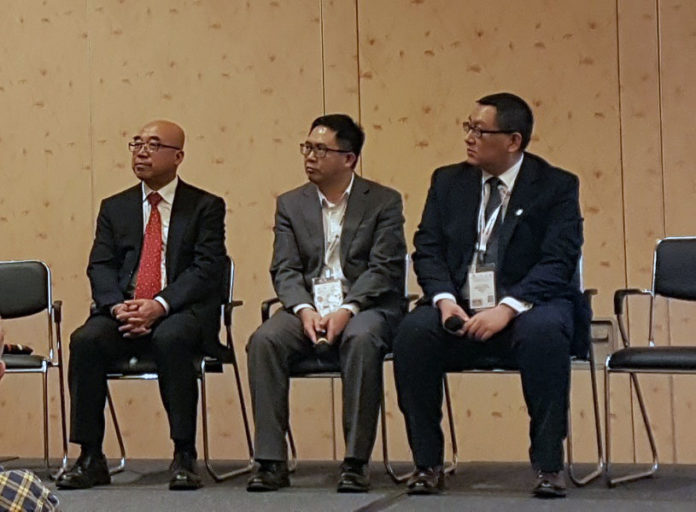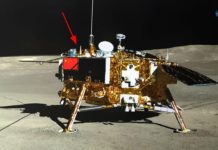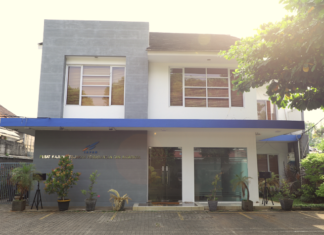
Many satcom giants are feeling the pressure with the advent of NewSpace, the introduction of new and disruptive technologies, and a general stagnation in revenues, all of which are instilling a sense of uncertainty in the industry.
Like these satcom operators, China, too, is facing a period of tremendous change in its space industry, and has to grapple with the above problems. However, unlike in Europe or the U.S., government regulations in China have only recently been relaxed to allow private sector participation in the space industry.
Last week, Singapore held its annual telecommunications trade show CommunicAsia, which saw satellite communication (satcom) being a prominent part of the event.
Among the highlights of the show was a panel discussion on China’s satcom market, comprised entirely of Chinese companies.
The panelists were: Huang Baozhong, Executive Vice President, APT Satellite (APT), Michael Yang, COO, China Communication Technology Satcom (CCT), and Wang Zhongmin, Head of Satellite, Zhongshan Tatwah Smartech (Tatwah). The panelists discussed strategies that would help their businesses go global.
Said APT’s Huang, “Originally, according to Chinese regulations, only licensed state-owned enterprises, 100% owned by the government, could engage in space activities. But now, the private sector can [enter the market].”
As such, China has witnessed a sudden burst of space-related activity in the private sector, especially in the past two years. Of these private sector players, startups working on reusable launchers and small satellites have attracted the greatest attention.
Besides these startups, large companies are also looking to expand their portfolios by entering the space industry. Their plans include remodelling themselves to become satellite operators, with plans to acquire their first geostationary communication satellites (GEO satellites) and thereby go global.
Why enter the GEO market?
Among these companies, two were represented on the panel: CCT and Tatwah. Both companies have plans to become satellite operators in spite of the fact that state-owned heavyweights like APT and China Satellite Communications (China Satcomm) — who own 14 GEO satellites between them — have cornered China’s domestic market.
CCT, for example, has traditionally been a manufacturer of microwave and satcom equipment, with no prior experience as a service provider.
Said Yang, “We produce a lot of microwave equipment and satcom equipment. In the past two years, the company has wanted to move up the value chain….because we have been in the satellite equipment manufacturing industry, it’s a natural extension to move the business into satellite communication, broadband, and services”. Additionally, Yang admitted to having little exposure to the satellite industry.
Likewise Tatwah, known best for being an RFID chip manufacturer, has decided to pivot by entering into the satellite business with little to no experience.
Said Wang, “Zhongshan Tatwah is a newcomer in this industry. We joined the industry in the middle of last year. The company is in the Internet of Things (IoT) industry, Over-the-top (OTT) broadcasting, and other such businesses”.
Both companies are leaping into the satcom operator business for the same reason — the manufacturing industry in China has become too competitive, and CCT and Tatwah both feel the need to expand into new markets in order to survive. The best way to do this, they feel, is by operating satellites, which will allow them to better access overseas markets.
Said Yang, “In manufacturing, the competition is very intense, so in order to have a long-term future, we are trying to move up the value chain to go into the service provider business”.
Added Wang, “Because the IoT and OTT markets are very competitive in China, we’re looking for some overseas markets. However, the internet industries in many countries are protected, especially in Southeast Asia. So satellite is the best way to establish connectivity, especially with new technologies such as the High-throughput satellite (HTS)”.
Global expansion: Target Southeast Asia, maritime industry
All three companies on the panel — CCT, Tatwah, and industry veteran APT — have ambitions towards global expansion, beginning with the Southeast Asian market.
Said Yang, “We’re very clear that we want to be a vertically-integrated service operator, just like Hughes and Viasat, in Southeast Asia. That’s why we’re starting with ground operations, partnering with ASEAN countries, and in the space segment, we’re also partnering with existing satellite operators….We’re taking advantage of the economic expansion and activity in the Southeast Asian countries, as well as the technology changes with HTS. Right now, we are already providing connectivity to the Philippines….and we hope to close a deal in Indonesia in the next 3 months”.
Tatwah is specifically looking to target the maritime industry, especially in fishing, beginning with Southeast Asia.
Said Wang, “…In fishing, the biggest market is China, and the second is Indonesia, and then other Southeast Asian countries and South Asia, and then there’s also quite a good market in South Europe. Therefore, we thought we could start the business from Southeast Asia, then South Asia, and then eventually go along to East Africa and South Europe”.
APT, on the other hand, is looking to provide communication to Belt and Road countries. Said Huang, “We are doing this step by step, including railway projects in Laos, including some Chinese projects in Malaysia and Indonesia. One example is West Sulawesi, in Indonesia, where there’s an industrial zone mainly backed by the Chinese companies. Even today, the local internet network is very poor. They asked us for help..and with one satellite covering so many countries, that will play a vital role [in connectivity]”.
Leveraging the Belt & Road Initiative
All three companies agreed that the Chinese government’s Belt and Road Initiative (BRI) will support their expansion efforts, to varying degrees.
For APT, the BRI is an integral part of expansion. As a state-owned enterprise, the company works closely with the government to beef up connectivity and logistics operations in BRI countries.
Said Huang, “If you look at our footprint, our satellite fleet, we cover nearly 100% of the Belt and Road countries. And communication is considered part of the infrastructure”.
Being entirely private companies, CCT and Tatwah will be looking for government support and financing in order to penetrate BRI countries.
Said Yang, “The biggest difference between APT and CCT is, APT is a state-owned enterprise. Nonetheless, we still see the opportunity in terms of support, especially in terms of financial support….What we’re doing is a huge long-term investment, so it’s crucial to have support from the Chinese government.”
A piece of the NewSpace pie
As China’s NewSpace sector grows, large companies such as APT and CCT are monitoring startups while taking steps to future-proof themselves in a changing industry.
CCT, for example, has invested in two Chinese NewSpace companies.
Said Yang, “I think cheaper launchers and smallsats have a big possibility of being successful in China. CCT has invested in these businesses – one in a launcher, and one in a small satellite company. We’re keeping our hands in the pot”.
APT, on the other hand, is studying the possibility of engaging these NewSpace companies.
Said Huang, “We at Apstar are also looking at launching small satellites manufactured by those companies. I think (these companies) are very ambitious, they want to compete with Blue Origin or SpaceX or others, but whether they will be successful, we need to wait and see”.






